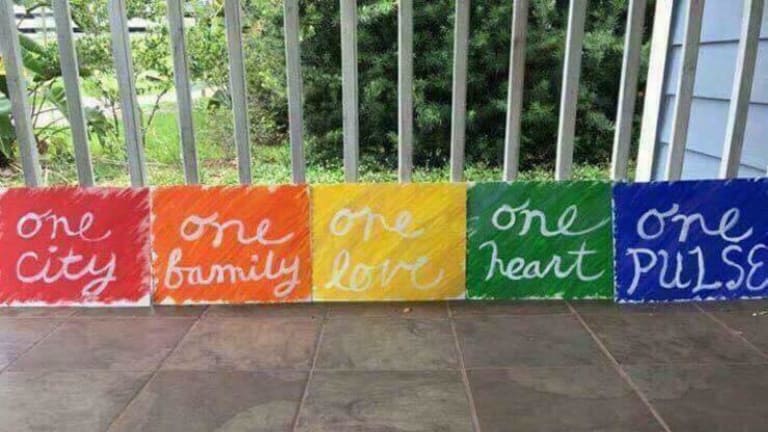I’m hardly alone in that. Many GLTA players, USTA competitors and even so-called weekend hackers feel the same way. As frustrating as playing tennis can be sometimes, the court is an oasis, and a safe haven. That’s why it’s excruciating to see it not become that for someone. When Monica Seles was stabbed in April 1993, it was unspeakably sad to see her return to the professional court two-and-a-half years later and, no longer entirely at home or at rest, turn her chair sideways on mid-match changeovers so that her back wasn’t to the crowds from whence her attacker had once emerged.
Similarly, Pulse was such a safe harbor once, and I trust it will be so again. For the 49 dead, their journeys ended within those walls, but their spirits live on through their loved ones after burning so brightly before that.
*
I picked up a racquet at age 15, as a high-school freshman, and started playing my lefty father just for fun. Only it wasn’t. I soon realized that I had a real verve to win, to get better and to figure out how to play this esoteric, skillful sport. Being generally athletic alone wasn’t going to cut it. (In honor of Father’s Day, it’s worth noting that it’s a big event in a young lad’s life when he beats his dad for the first time.)
That was 1996. I relished the resurgences of Seles and Andre Agassi then, careers previously thrust into hiatus due to physical attack, psychological injury or even lack of desire. I was captivated by them when they returned—and oh, how they returned the ball!—and then by the unbridled, raw power of the Williams sisters when they came on the scene. Everyone has their favorite players, and those are the personalities I found most compelling.
It was 12 years later, in 2008, after I had emerged from my closeted gay shell—another story entirely—that I first played in a GLTA tournament. It didn’t take much coaxing; I had joined my local IndyTennis community organization, a group of LGBT and allied enthusiasts, earlier that summer and made the logical progression to all-the-more organized, sanctioned play. Three events later, over Easter weekend in April 2009, I went on to participate in the Orange Blossom Tennis Championships in Orlando. I traveled there and played doubles alongside someone I was dating at the time. We went to dinner, enjoyed the nightlife and attended the tournament banquet—a fun feature at every GLTA event—at a local museum. (The GLTA commissioner, Dan Merrithew, is also the Orlando event’s director. Rain or shine, the man knows how to run a tournament seamlessly.)
I learned a lot from my early GLTA days, from observing and interacting with friends, the men I dated and other people in that sporting sphere. I learned the importance of character and integrity. I learned just how important it is to tell the truth, when calling lines and otherwise. I learned how to be a gay man in the 21st century. I learned how to be myself.
Many in Orlando, nationwide and around the globe, are re-learning how not to live in fear. They’re also offering tributes, both on and off the playing field, as best they know how, from Florida to the country's capital and everywhere else. The tragedy of the Pulse nightclub shooting strikes the loved ones of those killed and those injured more than it affects anyone else. Even so, the seeming randomness of the vile acts perpetrated there causes apprehension to extend among members of the LGBT community the world over. It may feel peculiar and disjointed to go out to LGBT-centric or LGBT-friendly establishments. Indeed, it has felt that way already. Too many people, of all backgrounds, have met violence in their lives.
Still, everyone has their outlet. For those affected by the Pulse tragedy, I pray they find healing to enjoy nightlife again and find more avenues of pleasure and fulfillment. For the people of the GLTA, tennis will remain a respite. And when I play in the Indy Tennis Classic again this September, it will mark the 34th GLTA event in which I've participated over just a few of my 34 years on the planet. It's just gay tennis, but it can mean the world.
